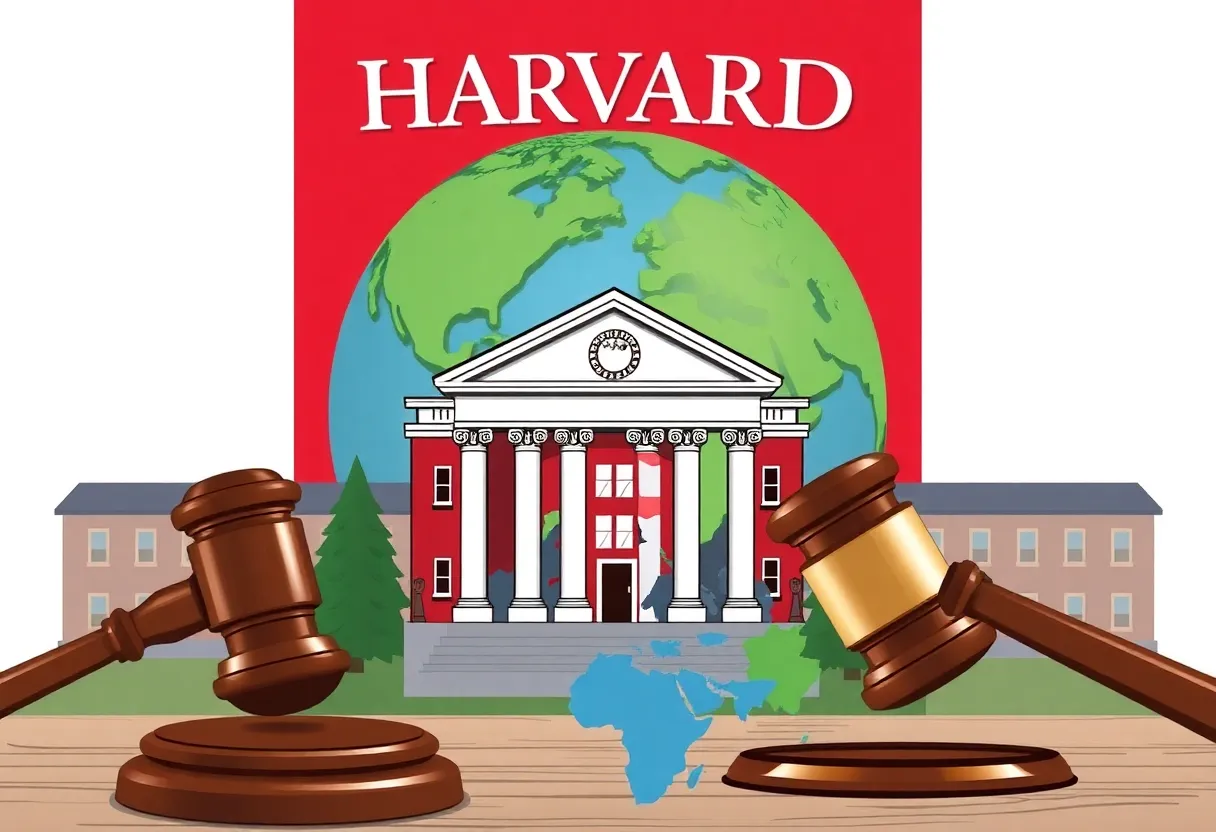News Summary
The Trump administration has enacted a proclamation banning new international students from attending Harvard University due to alleged national security concerns. This move directly targets Harvard, prompting significant backlash from the institution. Harvard has condemned the decision, citing violations of First Amendment rights and concerns over academic freedom. Legal challenges are anticipated as the university fights to protect its international programs. The proclamation raises questions about the future of over 7,000 international students studying at Harvard and may have broader implications for federal funding and tax-exempt status.
Trump Administration Hits Harvard with International Student Entry Ban
In a surprise move, the Trump administration has signed a proclamation that places a **big roadblock** for new international students and researchers seeking to attend **Harvard University**. This decision, driven by **national security concerns**, affects students coming to the U.S. on F, M, or J visas, often used for academic purposes or exchange programs.
Targeting Harvard
Harvard is feeling the heat as this measure appears to be a **direct response** to ongoing tensions between the Trump administration and higher education institutions. President Trump has pushed Secretary of State Marco Rubio to think about revoking the existing F, M, or J visas for current international students enrolled at Harvard. It’s important to note, though, that this proclamation won’t affect international students from other universities or those deemed in the **national interest**.
Concerns About Trust
The White House isn’t holding back when it comes to its criticisms of Harvard. There are allegations that foreign adversaries are taking advantage of American higher education, along with complaints about Harvard’s lack of transparency regarding **disciplinary records of foreign students**. According to the administration, Harvard is no longer considered a **trustworthy steward** of international student programs.
Harvard Responds
In response to these claims, Harvard has fully condemned the administration’s proclamation, calling it **illegal** and a blatant violation of its First Amendment rights. They express significant concerns about how this action undermines the principle of academic freedom and the positive contributions international students bring to the campus environment.
Legal Battles Ahead
Legal repercussions appear to be looming. Harvard has already initiated lawsuits to challenge the legality of the proclamation. This comes on the heels of a federal judge temporarily blocking the administration’s earlier attempts to revoke Harvard’s ability to host foreign students. So, the legal tussle is far from over.
Federal Concerns and Actions
The motivations behind this suspension seem to tie into broader federal concerns regarding student safety and security. The administration has pointed fingers at recent protests related to the Israel-Gaza conflict, implying that international students contributed to a **disruptive atmosphere**. Because of this, the administration’s confidence is high that the **courts will uphold** their legal stance.
Harvard’s Current International Student Body
Currently, more than **7,000 international students and scholars** call Harvard their academic home. This expansive international student body plays a vital role in creating a rich and diverse educational experience at the university. With this new proclamation hanging over them, concerns about their future and the potential impact on their studies have been ignited.
Review of Federal Aid and Potential Tax Implications
The administration’s proclamation also orders a review of the **federal grant funding** given to Harvard, raising the possibility of jeopardizing the university’s **tax-exempt status**. Such measures indicate a significant escalation in the administration’s strategy toward governing higher education, and the implications of this could be **wide-reaching**.
Future of International Students
The proclamation is scheduled to remain in effect for six months, with the possibility of an extension. However, it stipulates that foreign nationals can only enter the U.S. for Harvard’s programs if the university conforms to federal requests for information related to national security. This adds another layer of complexity to an already fraught situation, keeping everyone on their toes.
As the situation continues to develop, it’s clear that the **relationship between the Trump administration and Harvard University is more strained than ever**. Both sides are gearing up for a prolonged battle, and the effects of these policies on the campus community and international students remain to be seen.
Deeper Dive: News & Info About This Topic
- Forbes: Harvard Calls Out Illegal Retaliatory Step as Trump Bars Entry of Its International Students
- Reuters: Trump Signs Proclamation to Restrict Student Visas for Harvard
- New York Times: Trump and Harvard’s International Student Visa Controversy
- Washington Post: Harvard’s Response to Trump’s Visa Ban on International Students
- Encyclopedia Britannica: International Students

Author: STAFF HERE ORLANDO WRITER
ORLANDO STAFF WRITER The ORLANDO STAFF WRITER represents the experienced team at HEREOrlando.com, your go-to source for actionable local news and information in Orlando, Orange County, and beyond. Specializing in "news you can use," we cover essential topics like product reviews for personal and business needs, local business directories, politics, real estate trends, neighborhood insights, and state news affecting the area—with deep expertise drawn from years of dedicated reporting and strong community input, including local press releases and business updates. We deliver top reporting on high-value events such as Orlando International Fringe Theatre Festival, Megacon Orlando, and Central Florida Fair. Our coverage extends to key organizations like the Orlando Economic Partnership and Hispanic Chamber of Commerce Metro Orlando, plus leading businesses in leisure and hospitality that power the local economy such as Walt Disney World Resort, AdventHealth, and Universal Orlando. As part of the broader HERE network, including HEREJacksonville.com, HEREPetersburg.com, HERETallahassee.com, and HERETampa.com, we provide comprehensive, credible insights into Florida's dynamic landscape.




